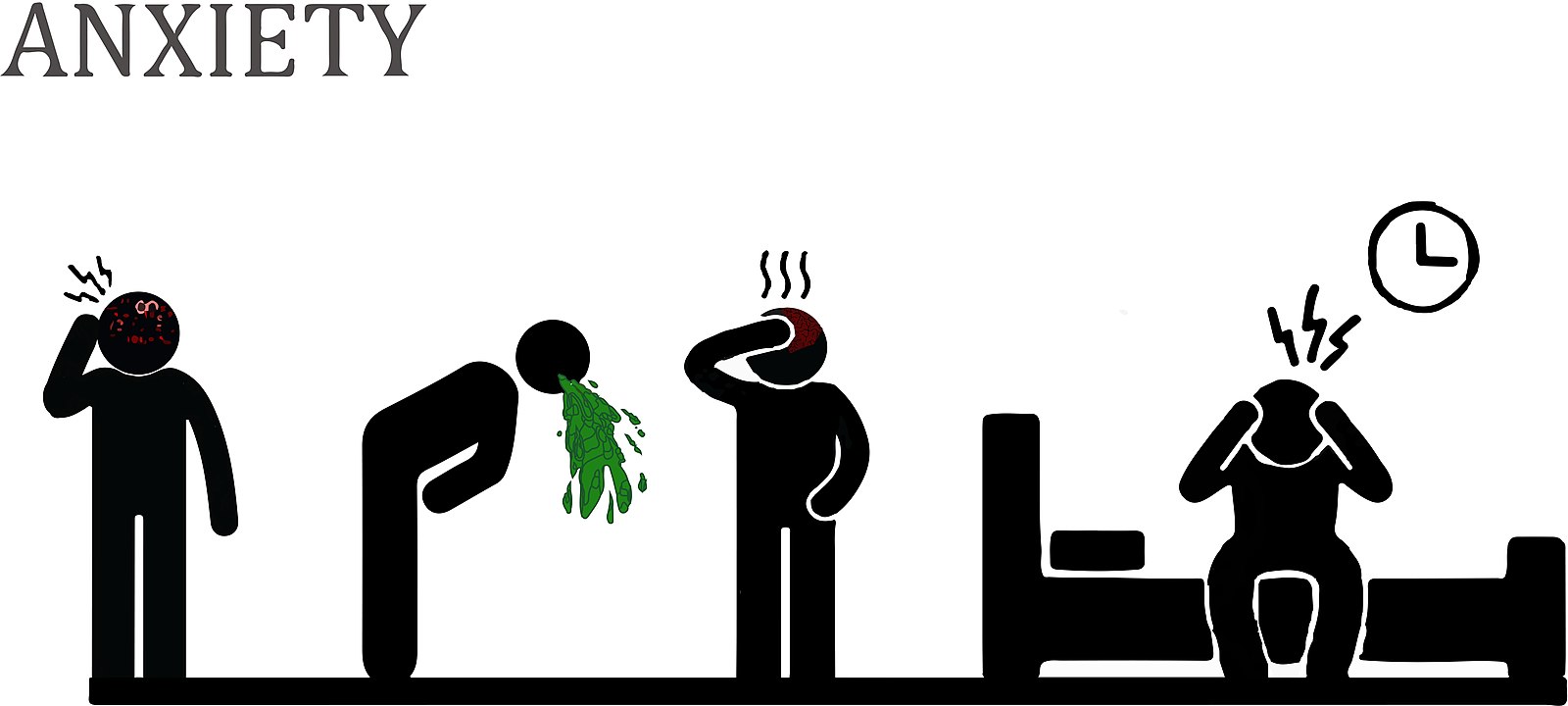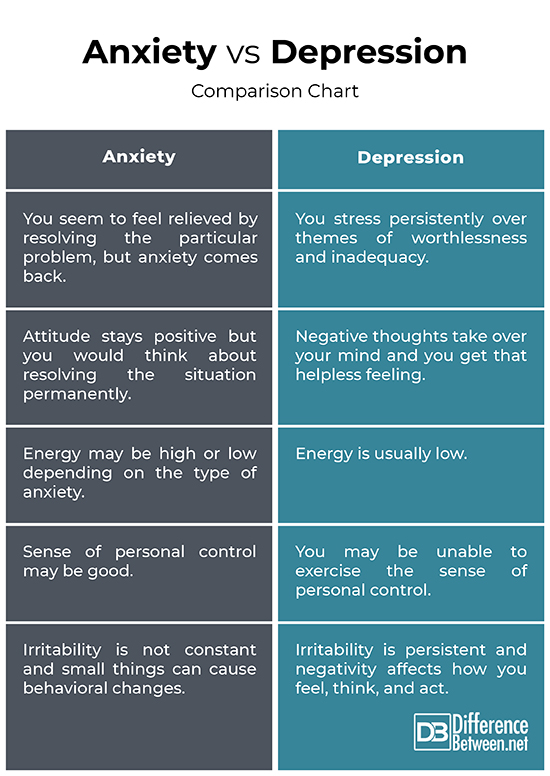Difference Between Anxiety and Depression
Anxiety vs. Depression
While the terms anxiety and depression may be used in the same context there are many differences between the two psychological problems. The symptoms of both disorders are often confused for one another; however a person who is experiencing anxiety over a long period of time will often become depressed. Both disorders can lead to irritability, lack of sleep, and a feeling of nervous tension, which all in turn can lead to problems in the home, at work, or in a social environment.

Anxiety is difficult for doctors to diagnose, those who suffer from the disorder often cannot even put words to the feelings they have. The constant feeling of worry over even the smallest tasks or problems plagues sufferers to a point of mental shutdown; they can focus on nothing but the worry. Panic attacks are common with anxiety sufferers, the body feels as though it is attacking itself, and they are common when a person has become overtaken with worry. A depression diagnosis is suspected when a person has seemingly given up on life. Those who are sad, indignant to life, and seem uninterested with those around them are showing symptoms of depression. There are some who suffer from severe depression who will even attempt to or do end their lives because they feel there is no purpose to living.
Both disorders are caused by similar internal and external conditions. The causes of anxiety include stress, substance abuse, and even side effect of other medications. The stress of school, work, or financial burdens can lead a person to feel the constant worry over these situations, enough so that it affects the rest of their lives. The causes of depression can include a history of abuse, or substance abuse, family loss, financial burdens, a traumatic event, and even heredity. A person who suffers from depression may have the hopeless feeling because they have been previously victimized, or are also feeling a large amount of stress. Both disorders can also come as a side effect of other medications intended to treat an entirely different medical condition. Some medications which help Parkinson’s disease, treat alcohol abuse, treat attention ‘“deficit hyperactivity disorder, and even male sexual dysfunction have been shown to cause signs of depression in those who are prescribed the medications. Studies have shown that depression can also be genetic, in that if someone in your immediate family suffers from clinical depression you stand a higher chance of also having the disorder.
While both anxiety and depression may seem similar they differ upon studying the brain. When studying the brain of those who have been diagnosed with anxiety it has become noted that the amygdala produces a higher feeling of insecurity to the body. That feeling can lead to increase in pulse, blood pressure, and shortness of breath when anxiety is leading to a panic attack. The brain of a person who is depressed typically has a smaller than average hippocampus, which means less serotonin production. Depression sufferers are unable to produce as much of the calming chemical, serotonin, as a non-sufferer. Anxiety and depression sufferers have a chemical imbalance in the brain, however each is of a different part.

The treatment process for those who are suffering from anxiety or depression is either prolonged therapy or medication, sometimes both. With therapy a person is encouraged to focus on a calming situation, so that when anxiety peaks they are able to control it using those calming skills. If you are depressed a therapist can help get to the cause of the depression and help you work through it. For those who are opposed to taking medication, therapy is a non-evasive treatment which can have equally as beneficial results. There are also medications which treat the brain’s imbalances which cause anxiety and depression, such as Prozac and Zoloft. These medications are prescribed by a doctor in order to treat the chemical problems within the brain causing either disorder. Both drugs are not a guarantee to counteract depression of anxiety and have a long list of side effects which accompany them.
While both anxiety and depression have clinical differences, they are both serious disorders. Sufferers should seek medical attention as soon as they feel symptoms of either disorder.
Difference between Anxiety and Depression
Anxiety and depression seem to be different sides of the same coin because they commonly occur together. Almost everyone, at some point of time, has experienced anxiety issues or depression and the circumstances that bring such conditions to light are often a surprise. As humans, we have a greater chance of accumulating chronic medical problems, which can lead to depression or anxiety. Both the conditions exhibit similar symptoms which presents a serious clinical challenge. Below, we’ll break down the differences between both the conditions.
What is Anxiety?
Anxiety is human body’s natural response to stress. Anxiety is a common reaction to excessive and persistent fear about everyday situations, events such as taking a final exam or speaking in front of a crowd. But when this feeling of uneasiness gets into your head and makes day to day life hard to live, it becomes a problem or you may call it a disorder or condition. Anxious people tend to worry about all the things in so many ways. And it impacts your life big time.
In anxiety, you stress about things that are about to happen or might happen, which means you cannot really focus on the things around you, like where you are or who you’re with. Anxiety is a normal emotion which makes you respond to certain things and circumstances in fear and dread. It is a way of brain to alert you of potential danger ahead. Well, everyone gets anxious at times, but when it crosses the line, it becomes a problem and this is where it requires attention.
What is Depression?
Most people experience some sort of mood swings that might cause a persistent feeling of sadness and loss of interest or feel low at some point in their lives, often after a stressful event. Sometimes this can happen for no apparent reason, which can be perplexing. These feelings of sadness, despair, or disinterest usually pass with a little time and you move on. But when these feelings last longer and interfere with your ability to work or socialize, it becomes a condition or you can call it a medical illness called depression.
Depression is typically classified as a mood disorder, but it can involve both psychological and physical symptoms, such as anger, loss of interest, a sense of pessimism, chronic fatigue, and changes in appetite, physical distress, or even thoughts of death. Whey psychological symptoms are accompanied by physical distress, it becomes a major problem and the condition is called major depression. Depending on the condition, it can have mild to moderate and severe effects on your mind and body.
Difference between Anxiety and Depression
-
Feeling
– Anxiety is a normal emotion which makes you respond to certain things and circumstances in fear and dread. It is a common reaction to excessive and persistent fear about everyday situations. Depression is typically classified as a mood disorder, but it can involve both psychological and physical symptoms. Attitude remains positive in anxiety but you would think about resolving the problem once and for all, while in depression, attitude is negative accompanied with this feeling of hopelessness.
-
Symptoms
– The symptoms of both the conditions can be similar, there are certain features that can help decide which condition may be dominant. Energy may be high or low depending on the type of anxiety accompanied by a constant feeling of uneasiness. In depression, energy is usually low, except in the highly active individual who is becoming burned out. Negativity is persistent in depression, while negativity isn’t constant in anxiety – it comes and goes.
-
Sleep Problems
– In anxiety, people often experience sleep problems such as restlessness or the inability to quiet the mind to fall asleep. Worry dream make sleep less restorative. Depressed people often experience early morning awakening or restlessness despite getting adequate sleep. In depression, the human body does not seem to feel restored despite sleeping enough hours.

Difference Between Anxiety and Depression
Summary
Although the symptoms of anxiety and depression can be fairly similar, there are certain features that can help you decide which condition is more dominant. People with anxiety disorder tend to be passive, low on the scale of energy and enthusiasm, and often feel withdrawn. They are not necessarily depressed, but their isolation can lead to depression. In addition, the feeling of helplessness and being socially incompetent make it difficult to cope with depression when it comes. Anxiety precedes depression most often. Anxiety and depression are both psychological disorders. Anxiety is a constant feeling of overwhelming worry. Depression is the overwhelming feeling of hopelessness. Depression affects the hypothalamus and anxiety affects the amygdala. Both depression and anxiety are treated with therapy or prescribed medications. Symptoms of either anxiety or depression are serious and a professional should be contacted immediately.
What is the main difference between anxiety and depression?
The main symptom of anxiety is the overwhelming feeling of fear, worry, or nervousness, while depression is a mood disorder that might cause this feeling of sadness, despair, or disinterest.
Is anxiety considered a form of depression?
Anxiety most often precedes depression, as the weight of anxiety is depressing. Both are different conditions, but they commonly occur together. For this reason people often confuse anxiety disorder with depression or vice-versa.
Why is it important to distinguish between anxiety and depression?
When people are anxious or depressed, they do not readily see a way out of their suffering. People who suffer anxious distress with depression may exhibit suicidal tendencies or need more intensive treatment. This is why it is very important to understand the difference between the two conditions.
What are the symptoms of anxiety?
Symptoms of anxiety include a sense of impending danger, feeling nervous, having a sense of dread, feeling restless, having difficulty concentrating, being irritable, feeling weak or tired, and so on.
Is anxiety a mental illness?
Anxiety disorder is a mental health condition that affects nearly 30% of adults at some point of their lives. It interferes with your ability to function, making it difficult to get through your day.
- Difference Between an Atomic Bomb and a Hydrogen Bomb - May 23, 2015
- Difference Between Multiplexer and Decoder - May 21, 2015
- Difference Between Chicken pox and Small pox - June 3, 2014
Search DifferenceBetween.net :
Leave a Response
References :
[0]Wehrenberg, Margaret. Anxiety + Depression: Effective Treatment of the Big Two Co-Occurring Disorders. New York, United States: W. W. Norton & Company, 2014. Print
[1]Miller, Mark D. and Charles F. Reynolds III. Depression and Anxiety in Later Life: What Everyone Needs to Know. Maryland, United States: Johns Hopkins University Press, 2012. Print
[2]Waller, Ryan Casey. Depression, Anxiety, and Other Things We Don't Want to Talk About. Tennessee, United States: Thomas Nelson, 2021. Print
